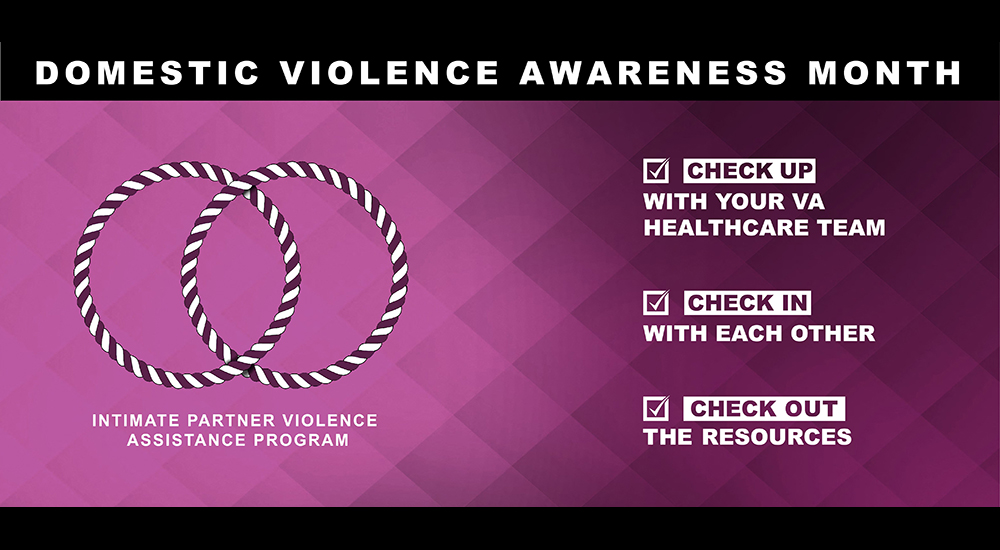In the United States, about one in four women (27%) and one in seven men (11%) report experiencing intimate partner violence (IPV). Research shows IPV prevalence is even higher in the Veteran population.
IPV is strongly associated with other public health issues. These issues include suicide, homicide and homelessness. IPV is a significant, preventable health concern for Veterans, their partners and VA staff. Unhealthy intimate relationships can negatively impact physical, mental and social wellbeing. Supportive and connected intimate relationships are important protective factors for physical and mental health.
October is National Domestic Violence Awareness Month.
VA’s Intimate Partner Violence Assistance Program (IPVAP) recognizes and acknowledges the importance of reviewing intimate partner relationships for health and safety. The program provides comprehensive and integrated services using a person-first, Veteran-centric, recovery-oriented and trauma-informed approach.
It provides and promotes services for all who are or may be impacted by the use and experience of IPV.
A relationship check is an opportunity for education, prevention and early intervention.
Important steps to check safety of relationship
The 2020 observance theme is “Check Up, Check In, Check Out Relationship Health and Safety.” It highlights three important steps to check the health and safety of an intimate partner relationship:
- CHECK UP with your VA health care team or IPVAP coordinator to assess your relationship. Learn to identify healthy and unhealthy behaviors and dangerous or unsafe factors.
- CHECK IN with your partner, friends, IPVAP Coordinator or VA health care team to set goals to optimize relationship health. Goals can include expressing appreciation, clear communication and conflict resolution. IPVAP can also provide information about planning opportunities to ensure safety during potentially dangerous situations.
- CHECK OUT the IPVAP website and community partner resources National Domestic Violence Hotline, Futures Without Violence and National Coalition Against Domestic Violence.
Importance of developing a self-care plan
Completing a relationship check up can help one recognize the importance of developing a self-care or time out plan for a stressful situation. The check up can provide early intervention and access to critical resources to promote recovery.
The relationship health and safety screening can be a part of every Veteran’s annual appointment. Even healthy relationships can benefit from enhancing communication and connectedness. It is important to check in with others. Discuss your relationship health and safety with an IPVAP coordinator or your VA health care team.
VA is a confidential place to discuss any questions or concerns a Veteran may have. Whether in a healthy or unhealthy relationship, VA is here to help with follow-up support and services.
Contact your local IPVAP coordinator to get “Check Up, Check In and Check Out Relationship Health And Safety” information and events for this month.
Tisha Petelo is chair of the IPVAP National Leadership Council Committee for Raising Awareness.
Topics in this story
More Stories
Veteran Byron Potier weighed almost 300 pounds and was tired and lethargic. He was the perfect candidate for gastric sleeve surgery.
How much do you know about VA care, benefits and services? Don’t miss out on what you've earned—check out the "2025 VA Federal Benefits Guide for Veterans, Dependents, Survivors, and Caregivers" handbook to learn more.
Feeling stressed? Your breath can help you relax and focus. Take 3 minutes to reset and prioritize your well being for this week's #LiveWholeHealth practice.







